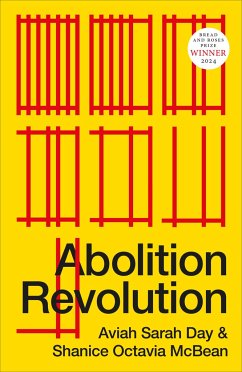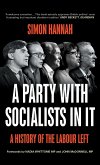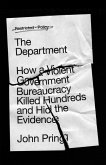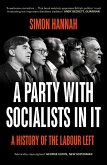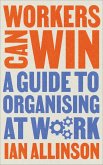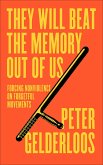22,99 €
inkl. MwSt.
Versandfertig in 2-4 Wochen

11 °P sammeln
- Broschiertes Buch
- Merkliste
- Auf die Merkliste
- Bewerten Bewerten
- Teilen
- Produkt teilen
- Produkterinnerung
- Produkterinnerung
An abolitionist manifesto for everyone fighting for revolution
Andere Kunden interessierten sich auch für
![Settler Colonialism Settler Colonialism]() Sai Englert (Netherlands Leiden University)Settler Colonialism18,99 €
Sai Englert (Netherlands Leiden University)Settler Colonialism18,99 €![A Party with Socialists in It A Party with Socialists in It]() Simon HannahA Party with Socialists in It114,99 €
Simon HannahA Party with Socialists in It114,99 €![The Department The Department]() John PringThe Department18,99 €
John PringThe Department18,99 €![A Party with Socialists in It A Party with Socialists in It]() Simon HannahA Party with Socialists in It22,99 €
Simon HannahA Party with Socialists in It22,99 €![Workers Can Win Workers Can Win]() Ian AllinsonWorkers Can Win15,99 €
Ian AllinsonWorkers Can Win15,99 €![They Will Beat the Memory Out of Us They Will Beat the Memory Out of Us]() Peter GelderloosThey Will Beat the Memory Out of Us13,99 €
Peter GelderloosThey Will Beat the Memory Out of Us13,99 €![Imperial Island Imperial Island]() Charlotte Lydia RileyImperial Island33,99 €
Charlotte Lydia RileyImperial Island33,99 €-
-
-
An abolitionist manifesto for everyone fighting for revolution
Hinweis: Dieser Artikel kann nur an eine deutsche Lieferadresse ausgeliefert werden.
Hinweis: Dieser Artikel kann nur an eine deutsche Lieferadresse ausgeliefert werden.
Produktdetails
- Produktdetails
- FireWorks
- Verlag: Pluto Press
- Seitenzahl: 320
- Erscheinungstermin: 20. November 2022
- Englisch
- Abmessung: 195mm x 129mm x 29mm
- Gewicht: 292g
- ISBN-13: 9780745346519
- ISBN-10: 0745346510
- Artikelnr.: 64108362
- Herstellerkennzeichnung
- Libri GmbH
- Europaallee 1
- 36244 Bad Hersfeld
- gpsr@libri.de
- FireWorks
- Verlag: Pluto Press
- Seitenzahl: 320
- Erscheinungstermin: 20. November 2022
- Englisch
- Abmessung: 195mm x 129mm x 29mm
- Gewicht: 292g
- ISBN-13: 9780745346519
- ISBN-10: 0745346510
- Artikelnr.: 64108362
- Herstellerkennzeichnung
- Libri GmbH
- Europaallee 1
- 36244 Bad Hersfeld
- gpsr@libri.de
Aviah Sarah Day is a Black community organiser with Sisters Uncut and Hackney Cop Watch. The rest of her time is spent lecturing in Criminology at Birkbeck, University of London, organising in her trade union branch, and reflecting on how to build workers' power through anarcho-syndicalism.
Introduction
Thesis 1. A national abolitionist movement has erupted in Britain.
Abolition is a tool to reimagine revolutionary politics.
Thesis 2. Our journey to abolition in Sisters Uncut was long and bumpy:
abolition is a road, not a destination!
Part 1 - The Tools of Police Power
Thesis 3. Race is at the heart of policing; without race policing can't
function. Dismantling the police means dismantling race.
Thesis 4. The police need public consent in order to exist. Withdrawing our
consent brings us closer to abolition.
Thesis 5. Coercion and control are the tactics of abusers, and coercing and
controlling the working class is the job of the police. Abolition is class
struggle!
Thesis 6. Women have always experienced the sharp end of state violence: if
your feminism is carceral, it's bullshit.
Part 2 - Roots In Empire: The History of Criminalisation and Resistance
Thesis 7. Class struggle in the 18th century sparked a prison abolitionist
fire. Abolition is nothing new.
Thesis 8. The UK rehearsed its strategies of control and punishment in the
colonies. Abolition continues anti-colonial and class struggle in Britain
today.
Part 3 - Systems of Criminalisation Today
Thesis 9. From student revolt to urban rebellion, abolition must harness
the radical energy of our youth!
Thesis 10. Bordering and policing protects colonial, imperialist and
capitalist wealth. Open borders is abolition and abolition is open borders!
Thesis 11. From the streets to the cell block incarcerated people have
organised to resist state violence.
Thesis 12. The 'War on Terror' expanded policing powers into everyday
institutions. Fighting Islamophobic racism is central to abolitionist
struggle.
Thesis 13. Capitalist crisis, neoliberalism and gentrification drive racist
'gangs' policing in Black communities. Abolition is a struggle against the
whole system!
Part 4 - Abolitionist Futures
Thesis 14. Gypsy, Roma and Traveller communities have led fierce resistance
to state violence. Abolition must unite different struggles.
Thesis 15. Crime is a social construct, but harm is real. Revolution is an
essential ingredient to building transformative approaches to harm from the
community level up.
Thesis 16. Revolution needs you...
Part 5 - Symposium: Abolition in the UK
Thesis 1. A national abolitionist movement has erupted in Britain.
Abolition is a tool to reimagine revolutionary politics.
Thesis 2. Our journey to abolition in Sisters Uncut was long and bumpy:
abolition is a road, not a destination!
Part 1 - The Tools of Police Power
Thesis 3. Race is at the heart of policing; without race policing can't
function. Dismantling the police means dismantling race.
Thesis 4. The police need public consent in order to exist. Withdrawing our
consent brings us closer to abolition.
Thesis 5. Coercion and control are the tactics of abusers, and coercing and
controlling the working class is the job of the police. Abolition is class
struggle!
Thesis 6. Women have always experienced the sharp end of state violence: if
your feminism is carceral, it's bullshit.
Part 2 - Roots In Empire: The History of Criminalisation and Resistance
Thesis 7. Class struggle in the 18th century sparked a prison abolitionist
fire. Abolition is nothing new.
Thesis 8. The UK rehearsed its strategies of control and punishment in the
colonies. Abolition continues anti-colonial and class struggle in Britain
today.
Part 3 - Systems of Criminalisation Today
Thesis 9. From student revolt to urban rebellion, abolition must harness
the radical energy of our youth!
Thesis 10. Bordering and policing protects colonial, imperialist and
capitalist wealth. Open borders is abolition and abolition is open borders!
Thesis 11. From the streets to the cell block incarcerated people have
organised to resist state violence.
Thesis 12. The 'War on Terror' expanded policing powers into everyday
institutions. Fighting Islamophobic racism is central to abolitionist
struggle.
Thesis 13. Capitalist crisis, neoliberalism and gentrification drive racist
'gangs' policing in Black communities. Abolition is a struggle against the
whole system!
Part 4 - Abolitionist Futures
Thesis 14. Gypsy, Roma and Traveller communities have led fierce resistance
to state violence. Abolition must unite different struggles.
Thesis 15. Crime is a social construct, but harm is real. Revolution is an
essential ingredient to building transformative approaches to harm from the
community level up.
Thesis 16. Revolution needs you...
Part 5 - Symposium: Abolition in the UK
Introduction
Thesis 1. A national abolitionist movement has erupted in Britain.
Abolition is a tool to reimagine revolutionary politics.
Thesis 2. Our journey to abolition in Sisters Uncut was long and bumpy:
abolition is a road, not a destination!
Part 1 - The Tools of Police Power
Thesis 3. Race is at the heart of policing; without race policing can't
function. Dismantling the police means dismantling race.
Thesis 4. The police need public consent in order to exist. Withdrawing our
consent brings us closer to abolition.
Thesis 5. Coercion and control are the tactics of abusers, and coercing and
controlling the working class is the job of the police. Abolition is class
struggle!
Thesis 6. Women have always experienced the sharp end of state violence: if
your feminism is carceral, it's bullshit.
Part 2 - Roots In Empire: The History of Criminalisation and Resistance
Thesis 7. Class struggle in the 18th century sparked a prison abolitionist
fire. Abolition is nothing new.
Thesis 8. The UK rehearsed its strategies of control and punishment in the
colonies. Abolition continues anti-colonial and class struggle in Britain
today.
Part 3 - Systems of Criminalisation Today
Thesis 9. From student revolt to urban rebellion, abolition must harness
the radical energy of our youth!
Thesis 10. Bordering and policing protects colonial, imperialist and
capitalist wealth. Open borders is abolition and abolition is open borders!
Thesis 11. From the streets to the cell block incarcerated people have
organised to resist state violence.
Thesis 12. The 'War on Terror' expanded policing powers into everyday
institutions. Fighting Islamophobic racism is central to abolitionist
struggle.
Thesis 13. Capitalist crisis, neoliberalism and gentrification drive racist
'gangs' policing in Black communities. Abolition is a struggle against the
whole system!
Part 4 - Abolitionist Futures
Thesis 14. Gypsy, Roma and Traveller communities have led fierce resistance
to state violence. Abolition must unite different struggles.
Thesis 15. Crime is a social construct, but harm is real. Revolution is an
essential ingredient to building transformative approaches to harm from the
community level up.
Thesis 16. Revolution needs you...
Part 5 - Symposium: Abolition in the UK
Thesis 1. A national abolitionist movement has erupted in Britain.
Abolition is a tool to reimagine revolutionary politics.
Thesis 2. Our journey to abolition in Sisters Uncut was long and bumpy:
abolition is a road, not a destination!
Part 1 - The Tools of Police Power
Thesis 3. Race is at the heart of policing; without race policing can't
function. Dismantling the police means dismantling race.
Thesis 4. The police need public consent in order to exist. Withdrawing our
consent brings us closer to abolition.
Thesis 5. Coercion and control are the tactics of abusers, and coercing and
controlling the working class is the job of the police. Abolition is class
struggle!
Thesis 6. Women have always experienced the sharp end of state violence: if
your feminism is carceral, it's bullshit.
Part 2 - Roots In Empire: The History of Criminalisation and Resistance
Thesis 7. Class struggle in the 18th century sparked a prison abolitionist
fire. Abolition is nothing new.
Thesis 8. The UK rehearsed its strategies of control and punishment in the
colonies. Abolition continues anti-colonial and class struggle in Britain
today.
Part 3 - Systems of Criminalisation Today
Thesis 9. From student revolt to urban rebellion, abolition must harness
the radical energy of our youth!
Thesis 10. Bordering and policing protects colonial, imperialist and
capitalist wealth. Open borders is abolition and abolition is open borders!
Thesis 11. From the streets to the cell block incarcerated people have
organised to resist state violence.
Thesis 12. The 'War on Terror' expanded policing powers into everyday
institutions. Fighting Islamophobic racism is central to abolitionist
struggle.
Thesis 13. Capitalist crisis, neoliberalism and gentrification drive racist
'gangs' policing in Black communities. Abolition is a struggle against the
whole system!
Part 4 - Abolitionist Futures
Thesis 14. Gypsy, Roma and Traveller communities have led fierce resistance
to state violence. Abolition must unite different struggles.
Thesis 15. Crime is a social construct, but harm is real. Revolution is an
essential ingredient to building transformative approaches to harm from the
community level up.
Thesis 16. Revolution needs you...
Part 5 - Symposium: Abolition in the UK
